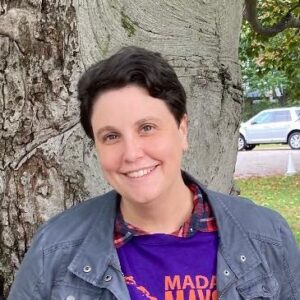Anna works with educators on the complex role of religion in public life as well as climate change education. She loves telling and learning stories of Boston’s political and ecological histories and supporting people working to build its more just future.
We caught up with Anna about growing up in a family of community organizers, the skills and wisdom she’s gained over time, and why challenging corporate power is important to social justice movements.
Why is challenging corporate power important to you?
What sticks out to me is how much corporations have shaped our public consciousness. Maximizing profit at the expense of people’s well-being has become an accepted reality of how the world works. Challenging corporate power is about disrupting that notion and realizing that the inequitable conditions we live in were not inevitable or driven by abstract, intangible forces, but are the result of direct choices that individuals and institutions made. Together, we can hold these corporations accountable and make them pay.
How do you see your role in the social justice movement?
I am a kid of community organizers, which is a part of my identity that I’ve claimed more and more as I’ve gotten older. My parents met organizing during the civil rights movement in Mississippi, and my dad spent his career pushing for equity in the Boston school systems. Our dinner table conversations comprised of stories about taking collective action, so I got a pretty good sense of what that looked like early on. This gave me a deeper appreciation of what organizers have accomplished throughout history, and what’s possible now.
Part of my role in the movement is taking the wisdom that I gained when I was younger and sharing it with my peer groups who feel the despair and frustration from the intersecting crises in our world, but who are disconnected from the collective, strategic work that’s happening.
What do you find effective about Corporate Accountability’s campaigns?
Corporate Accountability not only pushes back against the corporate narrative of personal responsibility, but it also provides a way for people to engage in the work and take action. A lot of my peers know that individual actions, such as using paper straws instead of plastic ones, are not going to change the world or stop the climate crisis, but they don’t know what else to do. Through collective action, we can push back against corporate power. It’s so important that people understand that.
What is giving you hope right now?
Movement building is long-term work, and we can’t always predict the outcomes of our actions. But we are stepping into a deep wellspring of skills and strategies from older generations who have accomplished big wins. And I believe we will make a lot of progress when we are guided by that wisdom.




